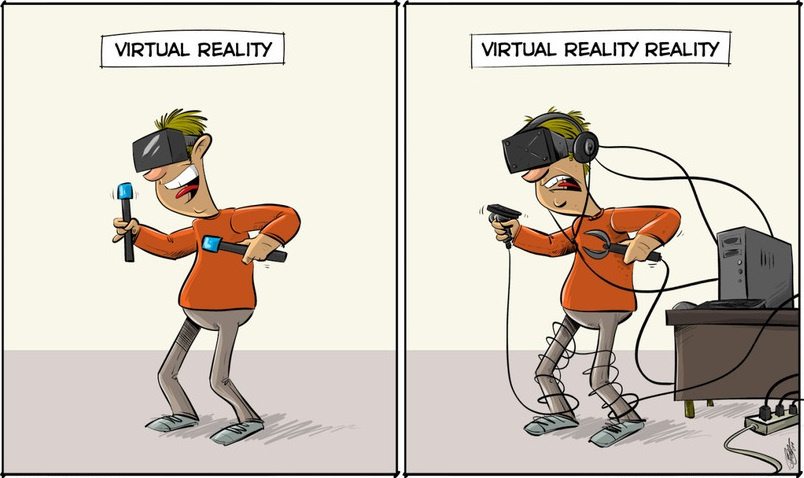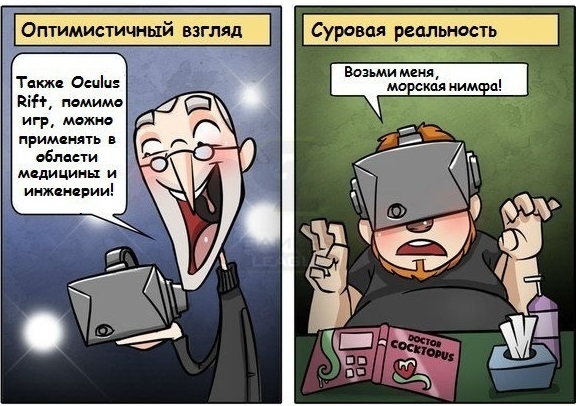Practice of applying virtual and augmented reality technology
In this article we will look at the complex and important questions about whether there is an industry of virtual and augmented reality; who needs it; what to do when you made another application for demonstrating real estate in virtual reality, but nobody buys it or went to the entertainment industry, and there is so much competition that it is impossible to push through.
The material was prepared on the basis of a lecture by Vasily Ryzhonkov, which was held at the VR-Today conference as part of our educational program “Game Management Management” at the Higher School of Business Informatics, HSE. Abstract and video and under the cut.

Vasily is the founder of ARenaLab , which develops various products and solutions in the field of virtual and augmented reality. In 2015, Vasily decided to make a system of total immersion, but now this project as a business does not exist. The company now operates in the b2b ( 360-marketing, real estate, industrial niche and entertainment market ) and b2c markets. The second direction of Vasiliy’s work is the development of a network of VR parks in Russia as part of ARena Space.
')
What defines the industry? Money and demand. In 1992, there was a third VR-wave, Nintendo Virtual Boy came out, which sold in the world in the amount of 300 000 - 400 000, this experiment was considered failed. About 700,000 HTC Vive and Oculus are sold today . The problem is that a lot of helmets were sold, and then the industry collapsed due to the fact that the industry did not meet consumer expectations. Until it becomes convenient, it will not be a mass market.

The main question is: when will it become a real industry? It is very important to measure the HYIP, which is created around virtual and augmented reality and the factors stopping development. Firstly, it is inconvenient, secondly, it is expensive, and thirdly, the content is still not enough.
Why install expensive systems related to virtual reality in real estate, if you can restrict yourself to simple Samsung Gear VR ? Do I need to show your apartment in VR, if you can just show the client a booklet?
It is important to understand whether it will give an economic effect.
2017 is a test of hypotheses. A lot of ideas already swept aside. It is important to solve real problems.
VR LA, CEO Unity :
“The challenges that face developers and those who use VR in the industry and business are not that you create a solution, but to what extent this solution is really justified and gives cost-effectiveness to a specific customer.” Economic efficiency is made up of three factors: improvement of processes, increase in customer's revenue, or decreased costs.

The market of augmented and virtual reality will develop. But a huge number of companies will die, because they do not have time to enter the market. It is very important to be smarter than colleagues. We are located in Russia, where 70% of the economy is state owned. Therefore, those companies that are somehow connected with the state will be successful. For example, Vizerra .
Or take the entertainment market. In Russia, it is approximately 50 billion rubles . At the same time in the Disneyland parks alone 17 million visitors a year. The average check that a family leaves there is $ 220-250 without hotel accommodation.
9 markets in which in one way or another various solutions are developed in VR and AR:

Of all the above markets, only real estate, entertainment, marketing and sports are competitive, if we take fitness clubs. All companies that try to create solutions go a very long way, from 6 months to a year, and not everyone can cope with it.
When choosing which market to go to, you need to think:
On the volume of this market in geography (Russia - the world)
How quickly can you provide some kind of solution for this market and implement it?
Is the market capacity sufficient?
Marketing is the most obvious case in VR, because everyone started with this. Presented cars, 360-video and so on.
The most famous marketing case is McDonald’s . They make customer activation so that they return via VR . You watch a video game, earn points that go to your personal account and get a discount on products.
Marriott . Hotel industry, which attracts additional customers. They sell their hotel in places where there is a lot of traffic. They put up special booths in which they advertised hotels.
Volvo . Presentations about new cars. Marketing activations are a new way to give emotions to people, but it is not clear whether there is any economic sense in this. It is not known how much the invested budget has paid off and whether the conversion to sales has increased.
IBM In-Store AR Shopping App . Immediately 2 directions VR and AR. The largest market in the world is trade. We constantly buy goods. Many companies go there.
IKEA . The opportunity to try on all the furniture in your apartment. The largest number of downloads in the real estate industry. But a huge number of companies are engaged in this, here you need to look for partnerships with famous brands.
In the 70s and 80s, the first helmets for aviation pilots appeared, which supplement the information in real time. These are expensive helmets, they still exist. The price of helmets that are purchased for the US Army can vary from 20 to 50 thousand dollars.
Now in industry, augmented reality (first of all) and virtual reality (second) are very often used. This is often done to ensure that employees pass any skills they need in VR in cases where it requires expensive equipment or when there are some risks behind it.
There is a proven fact of learning efficiency in VR. In China, a study was conducted with two groups of students. One of them learned from textbooks, the second - in VR. The performance of the second group immediately after passing the material was 20% higher, and after 2 weeks - by 15%.

And as the end, there are three main points:
In the fall, we begin training on our educational program “Game Project Management”, we invite you to come to our open events: on August 4, a lecture on the topic “ Game Industry: Management ”, on August 9, an open door , on August 11, a lecture on the topic “ Game Industry: artist in computer games ", August 18, lecture on the topic" Game industry: marketing ", August 23, lecture" Game design: game mechanics ".
The material was prepared on the basis of a lecture by Vasily Ryzhonkov, which was held at the VR-Today conference as part of our educational program “Game Management Management” at the Higher School of Business Informatics, HSE. Abstract and video and under the cut.

Vasily is the founder of ARenaLab , which develops various products and solutions in the field of virtual and augmented reality. In 2015, Vasily decided to make a system of total immersion, but now this project as a business does not exist. The company now operates in the b2b ( 360-marketing, real estate, industrial niche and entertainment market ) and b2c markets. The second direction of Vasiliy’s work is the development of a network of VR parks in Russia as part of ARena Space.
')
What defines the industry? Money and demand. In 1992, there was a third VR-wave, Nintendo Virtual Boy came out, which sold in the world in the amount of 300 000 - 400 000, this experiment was considered failed. About 700,000 HTC Vive and Oculus are sold today . The problem is that a lot of helmets were sold, and then the industry collapsed due to the fact that the industry did not meet consumer expectations. Until it becomes convenient, it will not be a mass market.

The main question is: when will it become a real industry? It is very important to measure the HYIP, which is created around virtual and augmented reality and the factors stopping development. Firstly, it is inconvenient, secondly, it is expensive, and thirdly, the content is still not enough.
Why install expensive systems related to virtual reality in real estate, if you can restrict yourself to simple Samsung Gear VR ? Do I need to show your apartment in VR, if you can just show the client a booklet?
It is important to understand whether it will give an economic effect.
2017 is a test of hypotheses. A lot of ideas already swept aside. It is important to solve real problems.
VR LA, CEO Unity :
“The challenges that face developers and those who use VR in the industry and business are not that you create a solution, but to what extent this solution is really justified and gives cost-effectiveness to a specific customer.” Economic efficiency is made up of three factors: improvement of processes, increase in customer's revenue, or decreased costs.

The market of augmented and virtual reality will develop. But a huge number of companies will die, because they do not have time to enter the market. It is very important to be smarter than colleagues. We are located in Russia, where 70% of the economy is state owned. Therefore, those companies that are somehow connected with the state will be successful. For example, Vizerra .
Or take the entertainment market. In Russia, it is approximately 50 billion rubles . At the same time in the Disneyland parks alone 17 million visitors a year. The average check that a family leaves there is $ 220-250 without hotel accommodation.
9 markets in which in one way or another various solutions are developed in VR and AR:
- Marketing
- The property
- Industry
- Entertainment
- Sport
- Publicism
- Culture and Tourism
- Education
- The medicine

Of all the above markets, only real estate, entertainment, marketing and sports are competitive, if we take fitness clubs. All companies that try to create solutions go a very long way, from 6 months to a year, and not everyone can cope with it.
When choosing which market to go to, you need to think:
On the volume of this market in geography (Russia - the world)
How quickly can you provide some kind of solution for this market and implement it?
Is the market capacity sufficient?
Marketing is the most obvious case in VR, because everyone started with this. Presented cars, 360-video and so on.
The most famous marketing case is McDonald’s . They make customer activation so that they return via VR . You watch a video game, earn points that go to your personal account and get a discount on products.
Marriott . Hotel industry, which attracts additional customers. They sell their hotel in places where there is a lot of traffic. They put up special booths in which they advertised hotels.
Volvo . Presentations about new cars. Marketing activations are a new way to give emotions to people, but it is not clear whether there is any economic sense in this. It is not known how much the invested budget has paid off and whether the conversion to sales has increased.
IBM In-Store AR Shopping App . Immediately 2 directions VR and AR. The largest market in the world is trade. We constantly buy goods. Many companies go there.
IKEA . The opportunity to try on all the furniture in your apartment. The largest number of downloads in the real estate industry. But a huge number of companies are engaged in this, here you need to look for partnerships with famous brands.
In the 70s and 80s, the first helmets for aviation pilots appeared, which supplement the information in real time. These are expensive helmets, they still exist. The price of helmets that are purchased for the US Army can vary from 20 to 50 thousand dollars.
Now in industry, augmented reality (first of all) and virtual reality (second) are very often used. This is often done to ensure that employees pass any skills they need in VR in cases where it requires expensive equipment or when there are some risks behind it.
There is a proven fact of learning efficiency in VR. In China, a study was conducted with two groups of students. One of them learned from textbooks, the second - in VR. The performance of the second group immediately after passing the material was 20% higher, and after 2 weeks - by 15%.

And as the end, there are three main points:
- Thesis number one. The virtual and augmented reality market is next big thing.
- Thesis number two - not soon.
- And third, you, as companies that develop something or use something, first need to think about whether there is a problem, whether this problem can be solved differently, and plan your resources so that you can get from the idea phase to the product that like the customer. And most importantly, we wish you very much success, work, develop the augmented and virtual reality market, it is incredibly interesting, and this is one of the growth markets in the IT industry.
You can watch the full version of Vasily's speech on VR-Today and the answers to the questions from the audience on its results in the video of the lecture:
Part 2
In the fall, we begin training on our educational program “Game Project Management”, we invite you to come to our open events: on August 4, a lecture on the topic “ Game Industry: Management ”, on August 9, an open door , on August 11, a lecture on the topic “ Game Industry: artist in computer games ", August 18, lecture on the topic" Game industry: marketing ", August 23, lecture" Game design: game mechanics ".
Source: https://habr.com/ru/post/332118/
All Articles